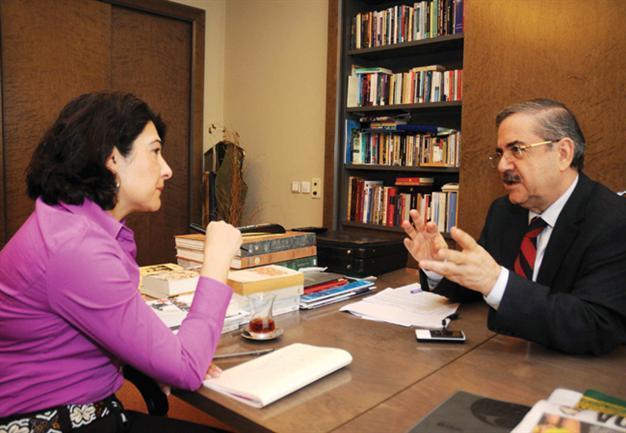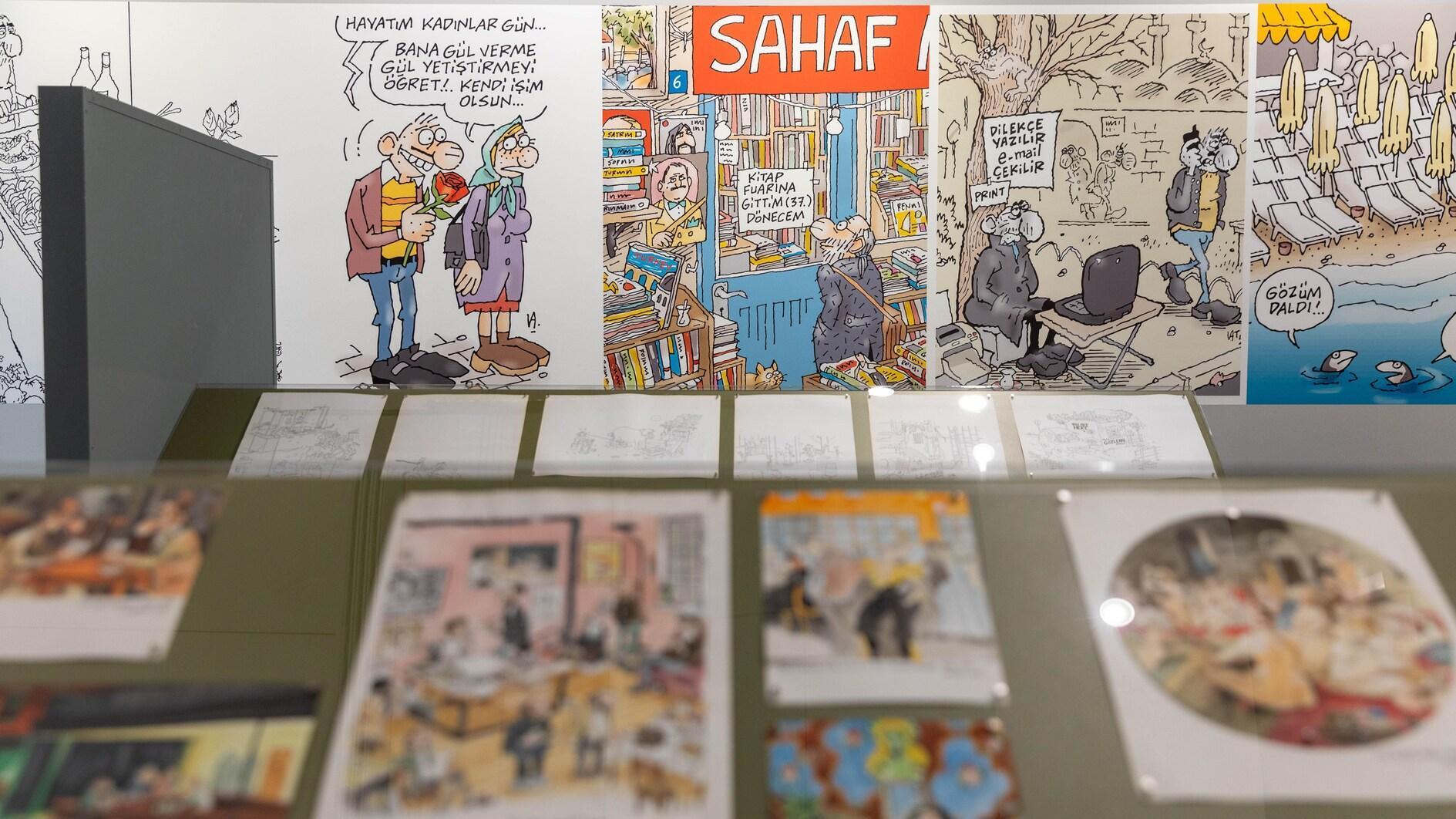'Turkey's real problem is authoritarian political culture'
ISTANBUL - Hürriyet Daily News

Turkey has been cleared of many aspects of Sept. 12’s legacies, says Taha Akyol. But questioning the authoritarianism of the pre-Sept. 12 actors remains important, he adds, speaking at the 11th floor of daily Hürriyet. DAILY NEWS photos, Hasan ALTINIŞIK
This week’s trial against the leaders of the Sept. 12, 1980, coup demonstrates Turkey’s democratic reflex in a society no longer under military tutelage, a prominent journalist has said while warning of aspects of Turkey’s political culture that could hamper further progress.The trail against retired generals Kenan Evren and Tahsin Şahinkaya “has more symbolic importance than its legal outcome. I find it important since it shows the democratic reflex in Turkey,” said journalist Taha Akyol, himself a victim of the coup.
But while hailing the symbolism of the trial, as well as lack of societal violence that presaged the brutal Sept. 12 coup, Akyol told the Hürriyet Daily News that Turkey’s problem continues to be the “authoritarian and conflict-based nature” of its political culture.
Q: How did Turkey look on Sept. 11, 1980?
A: The youth and politicians had gone mad. The two mainstream political parties could not unite to elect a president. The Turkey of Sept. 11 was a country to be ashamed of.
Q: How did Turkey come to that point?
A: Our political culture is not based on consensus but on conflict. To that was added the concept of the right and the left of the Cold War. We have a Sunni-Alevi differentiation that is centuries old. Attributing [the problems] to imperialism or to the Soviet Union is very superficial.
Q: Yet is often said that the army did not do much to stop the violence but instead waited for the conditions to mature to intervene.
Demonizing Sept. 12 and positing it as the mother of all illness will lead us to an impasse.
We have problems that come from our authoritarian nature. Turkey has been cleared of many aspects of Sept. 12’s legacies.
Q: It seems everyone saw the coup coming.
A: Everyone was expecting it but no one foresaw what the army [would do]. Sept. 12 was very brutal; there was widespread torture, hundreds of thousands were detained and interrogated. Sept. 12 was not just done to topple the government but to effect a “cleaning at the root.” State terror was implemented unlike anything before in Turkey’s history.
Q: Some would say it would have been better if Sept. 12 had not occurred.
A: The picture at that time did not give the impression that there would have been a solution based on consensus. If there was another way, that other way was not realized.
Q: So does that mean the army had no other way?
A: Yes and no. Yes, because politics was not bringing a solution, no, because the army could have gone for a more determined struggle for stability. But more important than Sept. 12 was what the army did afterwards.
Q: It is said that the majority of the population welcomed the coup.
A: My wife said, “Thank God, we are saved.” There wasn’t anyone who did not say that. Those fighting before Sept. 12 should realize how much hatred they garnered that people embraced the army. I have been listening to people from Dev Yol [The Revolutionary Left] before the court room. They talk as if they were all angels, as if they had not killed or made people kill and as if the military intervened out of the blue and came to sweep away the revolutionaries. How about those killed by you? I say that for both sides.
Q: What is the legacy of Sept. 12?
Our real problem is the authoritarian and conflict-based nature of our political culture. This polarization prevents us from thinking analytically. We are a society that can’t think analytically in the age of information.
Q: Turkish society is said to have become depoliticized by Sept. 12.
A: Let’s not forget the resentment that the bloody outcome of the pre-Sept. 12 period’s politicization created, especially in mothers. Society did not become depoliticized just because the military ordered it so.
It is true that Turkey has entered a period of depoliticization and that brought a disinterest in democracy. But isn’t Turkey very polarized today? Isn’t this politicized?
Q: Does the trial symbolize the end of military coups in Turkey?
A: It does but at the same time, the reason why the period of military coups is over is due to the development of Turkey’s market economy and democratic culture. Turkey has integrated into the world economy with its 150 billion-dollar exports; in such a country, you cannot stage a coup. No coup plotter thought about what would become of the stock exchange before launching a coup. There was no stock exchange on Sept. 12.
Q: What is then the significance of the trial in Turkish political life?
A: It has more symbolic importance than its legal outcome. I find it important since it shows the democratic reflex in Turkey.
Q: Some claim it is just a show.
A: The trial of Sept. 12 should be limited to the trial of the military wing, while the lessons of Sept. 11 should never be forgotten. But asking to put all the Cabinet from that time together with all the bureaucracy on trial has no legal seriousness. A person that says those that are not covered by Article 15 of the Constitution, [which had given immunity to coup leaders until it] was revoked by the 2010 referendum, needs to base it on universal legal rules. Those subject to Article 15 are not subject to the statutes of limitation, but whether the rest are subject to the statute of limitations is legally controversial. Coup leaders were tried in Greece, but was the Greek bureaucracy of the time tried?
Q: Many claim that what’s important is to get rid of the Sept. 12 mentality that still exists in Turkey.
A: But that is about state tradition and political culture, which predate Sept. 12. Demonizing Sept. 12 and positing it as the mother of all illness will lead us to an impasse. We have problems that come from our authoritarian nature. Turkey has been cleared of many aspects of Sept. 12’s legacies. Turkey is no longer under military tutelage. The judicial oligarchy established by Sept. 12 was changed to a great degree in the 2010 referendum. The penal code was amended in 2004. It’s not for nothing that Turkey has been named as a candidate for the European Union. But of course, there are still problems in practice, like the authoritarian nature of the judges. But this is about political culture.
Q: There is criticism that a civilian tutelage has replaced military tutelage.
A: I don’t agree. There is governmental authoritarianism but this can change if the government changes its stance or when the government changes. Military tutelage was institutionalized by the Constitution after Sept. 12, as in the case of the National Security Council.
Q: From right to left, many gave the impression of unity in the trial’s courtroom. What does this tell us?
A: I would rather have wished that those politicians of the past claiming to have struggled against Sept. 12 would make some self-criticisms. As I see authoritarianism in our political culture as the main problem, questioning the authoritarianism of the pre-Sept. 12 actors is very important to me. Yet this is not being done. The fact that Sept. 12 was vicious and illegitimate does not vindicate everything on Sept. 11.
Q: But is it enough to judge just two generals? How best can we deal with Sept. 12?
A: But we are dealing with it. The ideology of Sept. 12 has collapsed. There is no one in Turkey defending Sept. 12. But Parliament could set up commissions to search for the truth, especially for the bloody events prior to Sept. 12.
Q: You said Turkey still suffers today from extreme polarization. Not much progress since Sept. 12 then?
A: Today there are no weapons, thankfully. Our real problem is the authoritarian and conflict-based nature of our political culture. This polarization prevents us from thinking analytically. We are a society that can’t think analytically in the age of information. Everything is white and black in Turkey. That’s where my anger comes from.
Who is Taha Akyol?

A graduate of Istanbul University’s law faculty, Akyol started his professional career as a lawyer in the Eastern city of Yozgat. After moving to Ankara he began writing columns for daily Hergün.
He was arrested during the Sept. 12, 1980 military coup, as he was one of the high level members of Nationalist Movement Party (MHP) at the time. He was held in Ankara’s notorious Mamak prison, but was acquitted during the trial.He wrote columns for 20 years for daily Milliyet and currently he is a columnist for daily Hürriyet, also hosting a T.V. program on CNN Turk. Akyol is the author of several books, including “Violence in Politics,” “Science and Delusion,” “Sects and States in the Ottoman Empire and Iran,” “But Which Atatürk” and “Atatürk’s Law of Revolution.”
















